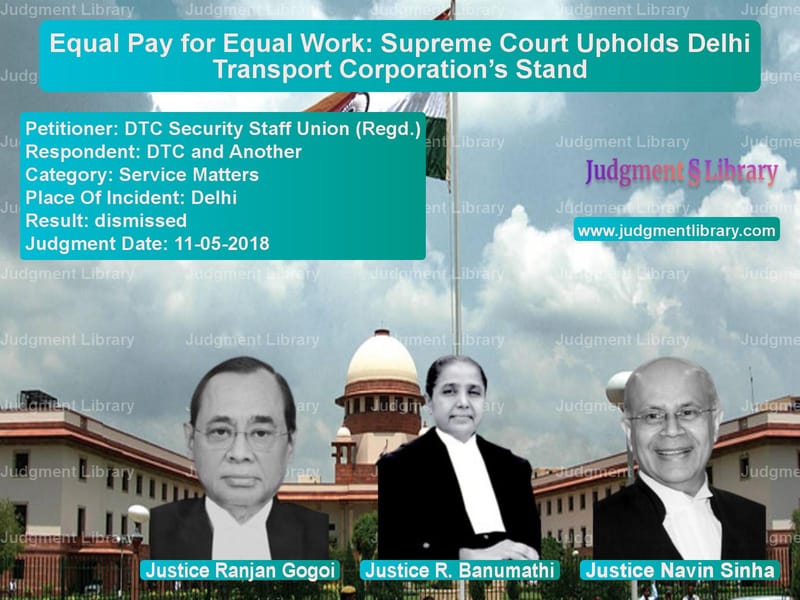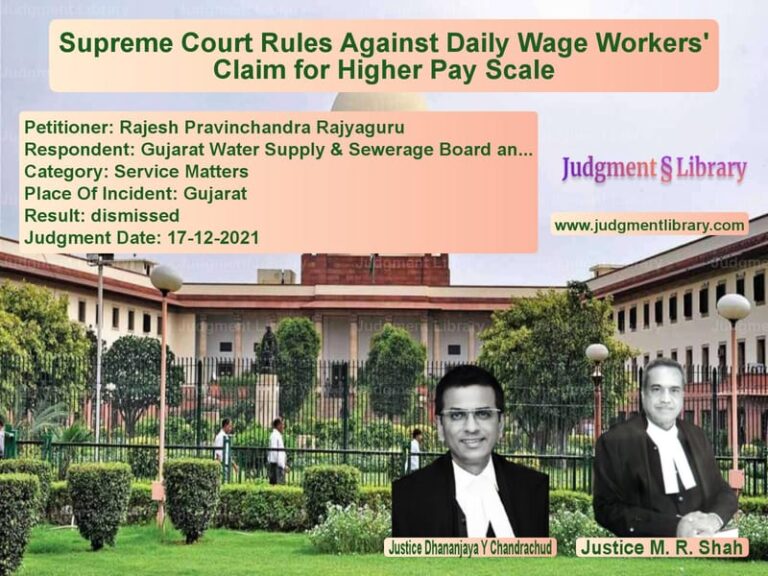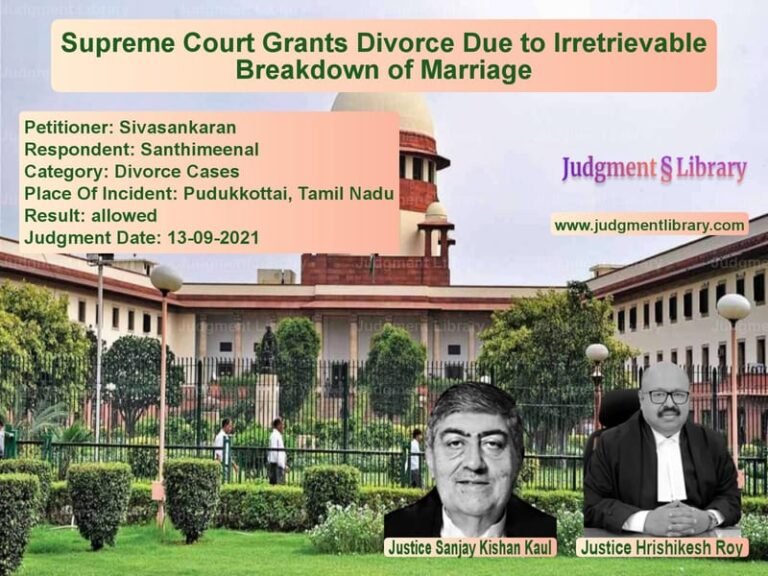Equal Pay for Equal Work: Supreme Court Upholds Delhi Transport Corporation’s Stand
The case of DTC Security Staff Union (Regd.) vs. DTC and Another revolves around the demand for equal pay for security personnel in the Delhi Transport Corporation (DTC) in comparison to their counterparts in the Delhi Police. The Supreme Court examined the validity of these claims in light of past pay commission recommendations and the constitutional principles of wage determination.
The core issue before the Supreme Court was whether the pay scale of Assistant Security Officers, Security Havaldars, and Security Guards in DTC should be on par with their counterparts in the Delhi Police. The Industrial Tribunal had ruled in favor of the security staff union, but the High Court reversed this decision. The Supreme Court upheld the High Court’s ruling, reinforcing the principle that wage determination is a complex matter best left to pay commissions and the government.
Background of the Case
The dispute began in 1979 when the DTC Security Staff Union sought a reference under the Industrial Disputes Act, 1947, demanding a revision of pay scales for security staff in DTC. The Industrial Tribunal, in its award dated August 22, 1985, ruled that:
- Assistant Security Officers in DTC should receive Rs. 425–700 per month.
- Security Havaldars should receive Rs. 260–350 per month.
- Security Guards should receive Rs. 225–308 per month.
The Tribunal justified this decision by drawing parity with equivalent ranks in the Delhi Police. The Delhi Transport Corporation, however, challenged this ruling before the High Court.
Key Legal Issues
The Supreme Court considered several crucial legal issues:
- Whether the Industrial Tribunal had the authority to determine pay scales.
- Whether security personnel in DTC performed duties comparable to those of Delhi Police officers.
- The impact of multiple pay commission recommendations on wage revision.
- The financial burden of implementing the Tribunal’s award.
Arguments of the Parties
Petitioner’s (DTC Security Staff Union) Arguments
The petitioner’s counsel argued:
- The Tribunal’s award was based on sound reasoning and should be implemented.
- There was significant similarity in job responsibilities between security staff in DTC and their counterparts in the Delhi Police.
- The principle of “equal pay for equal work” mandated parity in pay scales.
- Until 1962, the pay scales of security personnel in DTC were at par with those of the Delhi Police.
- Refusal to implement the award violated constitutional principles guaranteeing a fair and just wage.
Respondent’s (Delhi Transport Corporation) Arguments
The counsel for DTC contended:
- Pay scales in DTC were fixed according to pay commission recommendations, not based on comparisons with other organizations.
- The security staff in DTC had different qualifications and job responsibilities compared to Delhi Police personnel.
- The financial burden of implementing the Tribunal’s award was unsustainable.
- The Government of Delhi, which funds DTC, did not approve the pay revision.
- The Tribunal overstepped its jurisdiction by interfering in wage determination, which is a policy matter.
Supreme Court’s Ruling
The Supreme Court upheld the High Court’s ruling that set aside the Tribunal’s award. The judgment made several key observations:
“Fixation of pay scale is a highly technical and complex matter, which requires consideration of a host of factors such as the qualifications for the posts, the method of recruitment, and the nature of duties.”
The Court referred to past judgments emphasizing that courts and tribunals should refrain from interfering in pay scale determinations unless there is a clear case of arbitrariness or discrimination.
Key Takeaways from the Judgment
- The Industrial Tribunal overstepped its authority by intervening in pay scale fixation.
- The concept of “equal pay for equal work” must be applied with caution, considering job responsibilities, recruitment criteria, and organizational structure.
- Pay commissions, not courts or tribunals, are the appropriate bodies to determine wages.
- Financial implications and government funding constraints are valid considerations in wage disputes.
Conclusion
The Supreme Court’s ruling in this case reinforces the principle that wage determination is a complex process requiring careful consideration by expert committees such as pay commissions. It upholds the role of the government and employers in determining wages based on economic feasibility and administrative needs.
By dismissing the appeal, the Supreme Court reaffirmed that pay scales must be revised through proper channels and not through judicial or quasi-judicial interventions. This case serves as an important precedent for similar wage disputes in public sector organizations.
Petitioner Name: DTC Security Staff Union (Regd.).Respondent Name: DTC and Another.Judgment By: Justice Ranjan Gogoi, Justice R. Banumathi, Justice Navin Sinha.Place Of Incident: Delhi.Judgment Date: 11-05-2018.
Don’t miss out on the full details! Download the complete judgment in PDF format below and gain valuable insights instantly!
Download Judgment: DTC Security Staff U vs DTC and Another Supreme Court of India Judgment Dated 11-05-2018.pdf
Direct Downlaod Judgment: Direct downlaod this Judgment
See all petitions in Employment Disputes
See all petitions in Promotion Cases
See all petitions in Public Sector Employees
See all petitions in Judgment by Ranjan Gogoi
See all petitions in Judgment by R. Banumathi
See all petitions in Judgment by Navin Sinha
See all petitions in dismissed
See all petitions in supreme court of India judgments May 2018
See all petitions in 2018 judgments
See all posts in Service Matters Category
See all allowed petitions in Service Matters Category
See all Dismissed petitions in Service Matters Category
See all partially allowed petitions in Service Matters Category







